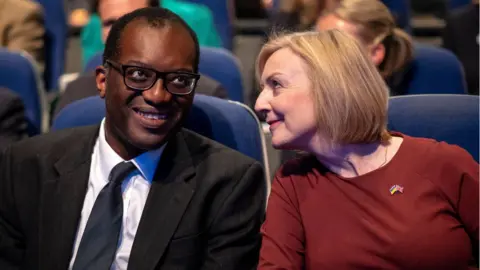Office for Budget Responsibility: What is the OBR and what does it do?
 Getty Images
Getty ImagesThe Office for Budget Responsibility (OBR) monitors the UK government's spending plans and performance.
Twice a year, it releases forecasts on the state of the economy and the public finances.
What is the OBR and what does it do?
The OBR assesses the health of the UK's economy. It is independent of government but works closely with the Treasury.
Its reports are usually released alongside big government events such as the Budget and Autumn Statement.
Before these announcements, the government gives the OBR details of its plans to raise or lower taxes and how it intends to spend public money.
The OBR checks the information and makes economic forecasts covering the next five years.
These forecasts cover things like whether the government will spend more money than it raises, and whether the UK's economy will grow or shrink.
The OBR's next forecast will be published alongside Chancellor Rachel Reeves's Spring Forecast on 26 March.
Why do OBR forecasts matter?
The OBR uses its forecasts to assess whether the government is likely to meet the rules it has set for managing the economy.
Its judgement on whether the government's plans are sound is important to financial investors. They help fund government spending by buying its bonds - which are a type of IOU.
This means some of the government's borrowing costs are determined by how the financial markets respond to the OBR's assessments and forecasts.
Does the government have to follow OBR advice?
In July 2024, the incoming Labour government said it would pass a new law designed to prevent any future administration sidelining the OBR.
The law was passed in September 2024, giving the OBR powers to make judgements on any major taxation or spending announcements, to provide "stability", the Treasury said.
In September 2022, Liz Truss's government put forward a set of unfunded tax cuts in its mini-budget without consulting the OBR first.
The value of the pound crashed, signalling that international investors had no confidence in the government's measures, and the Bank of England was forced to step in to protect pension funds.
Truss and her chancellor, Kwasi Kwarteng, had rejected the OBR's offer to prepare a draft economic forecast.
Many said the decision not to consult the OBR was a key reason for the lack of investor confidence.
 EPA
EPAJeremy Hunt, who replaced Kwarteng as chancellor shortly afterwards, said it was a mistake by the government to "fly blind" without the OBR's input.
After Reeves's first major speech as chancellor, the OBR also suggested there were billions of pounds of spending pressures that it did not know about when preparing its forecast in March 2024.
While the Conservatives have insisted they provided all necessary information, Reeves pushed forward with the Budget Responsibility Law as part of her pledge to further strengthen the OBR to avoid any future "cliff edge" being identified.
In a letter written in July 2024, she said the OBR would be able to question government assumptions about departmental spending, and demand more details on whether departments were likely to overspend or underspend.
She also said that spending reviews would now happen every two years, with detailed plans being set out in advance.
Why and when was the OBR created?
The OBR was set up in 2010 under the Conservative-Liberal Democrat coalition government.
Before that, the government produced its own economic forecasts.
The OBR was designed to provide independent analysis of the UK economy that was not influenced by party politics.
It also assesses some aspects of the financial policy decided by the Scottish and Welsh governments.
Who runs the OBR?
The OBR is led by a Budget Responsibility Committee.
It has three members, including the current chair Richard Hughes, whose five-year term began in October 2020.
